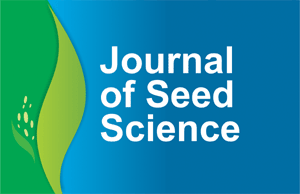The seed maturation process is genetically controlled and involves an arranged sequence of morphological and physiological changes extending from fertilization to its total independence from the mother-plant. These changes also include a set of preparatory phases for the germination process, which are characterized for the synthesis and accumulation of nutrient reserves. Thereby, this study was developed aiming at assessing development and physiological quality of cowpea seeds during maturation process. To this, the cowpea pods of cultivar BRS-Guariba were harvested from the tenth day after anthesis (DAA) until the twenty sixth DAA, with four days intervals. Immediately after each harvest, seeds were manually extracted from the pods and then subjected to the following determinations: moisture content, first count of germination, final germination percentage, length of shoots and roots, hypocotyl diameter, and seedling dry mass. The experiment was conducted in a completely randomized design, with five treatments (DAA), and four replications to each treatment. Results have shown that cowpea seeds have fairly fast physiological maturation, and that seeds harvested between 14 and 18 DAA have better vigor as well as higher germination rates; thus the harvest performed during this period does not cause damages to seeds.
Vigna unguiculata L.; physiological quality; vigor
